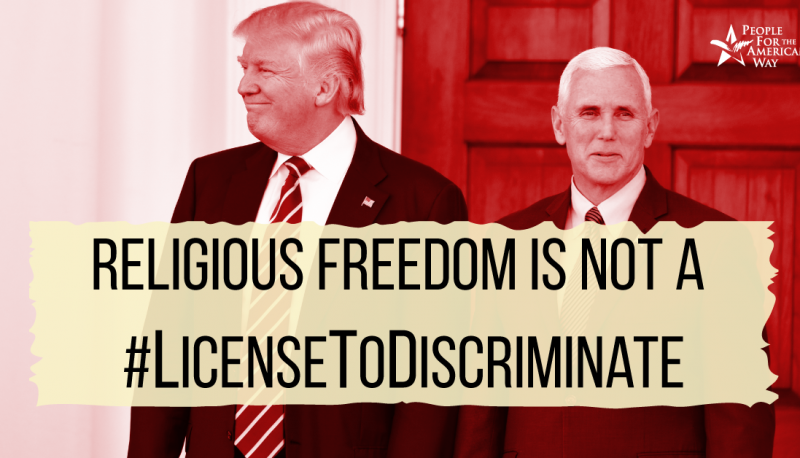President Donald Trump is reportedly planning to use the National Day of Prayer on Thursday to sign an executive order on so-called religious liberty. If it’s anything like a draft order that leaked three months ago, it will be a particularly damaging and discriminatory form of political payback to Religious Right leaders who mobilized white evangelical voters on Trump’s behalf.
According to Politico, Trump is inviting conservative leaders to the White House for the signing. Vice President Mike Pence, a Religious Right favorite, who as governor of Indiana signed a state law sanctioning religious discrimination, has been pushing behind the scenes for the executive order. In March, Right Wing Watch noted that more than 150 members of the secretive right-wing Council for National Policy had signed a letter pushing Trump to issue the order. Some Religious Right groups have publicly noted its absence from Trump’s first 100 days—though his administration has already taken other actions to undermine protections for LGBTQ people.
In February, the Nation published a leaked draft of an executive order, describing it as a sweeping plan to legalize discrimination by creating “wholesale exemptions for people and organizations who claim religious or moral objections to same-sex marriage, premarital sex, abortion, and trans identity.” It would also undermine women’s access to contraception and abortion under the Affordable Care Act. People For the American Way Foundation and its affiliate PFAW believe that religious freedom is at the heart of the American ideal, but also that the First Amendment was meant to provide a shield to protect individuals’ exercise of religion, not a sword with which to restrict others’ rights.
Experts told reporter Sarah Posner that the scope of the draft order was “staggering.” It would define religious organizations to include closely held for-profit organizations and would allow people to act on their religious beliefs “when providing social services, education, or healthcare; earning a living, seeking a job, or employing others; receiving government grants or contracts; or otherwise participating in the marketplace, the public square, or interfacing with Federal, State or local governments.” One legal expert said it could even invite federal employees to refuse to process applications for social security benefits or respond to questions about veterans’ benefits for same-sex spouses.
The Religious Right’s demand for such an order exposes the dishonesty of claims by multiple speakers at a recent Supreme Court rally that the Religious Right is not looking for special privileges but only seeking equal treatment under the law. In fact, they are looking for special treatment, even when it comes at the expense of other people, and even if it means using taxpayer dollars in discriminatory ways.
A broad order could be challenged in Court: a religious refusal law passed in Mississippi last year was declared unconstitutional by a federal district court, though the case is on appeal.
It’s worth noting that the public does not support legal protection for such religious refusals. The Public Religion Research Institute reported in February that 61 percent of Americans are opposed to “allowing a small business owner … to refuse to provide products or services to gay or lesbian people, if doing so violates their religious beliefs.” PRRI noted that white evangelical Protestants are the only religious group “in which a majority does not oppose religiously based service refusals by small businesses.” A 2015 Pew poll that asked specifically about allowing businesses that provide wedding services to refuse to serve same-sex couples showed a narrower split, but still found that more Americans opposed than supported giving legal cover to that kind of discrimination.

